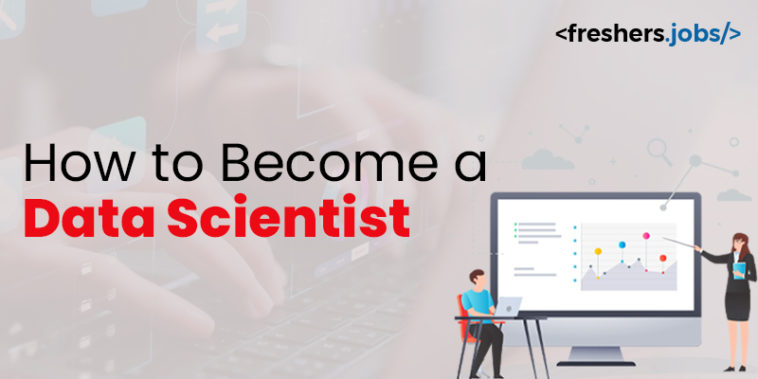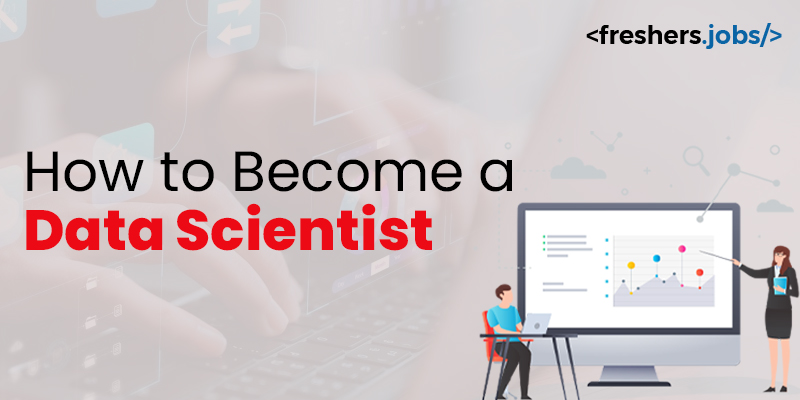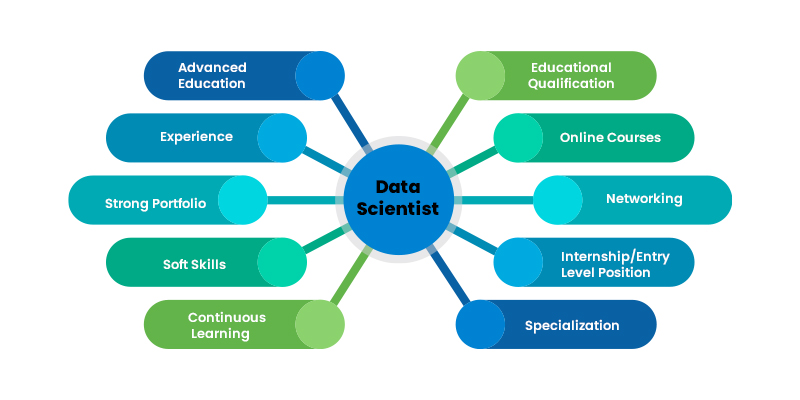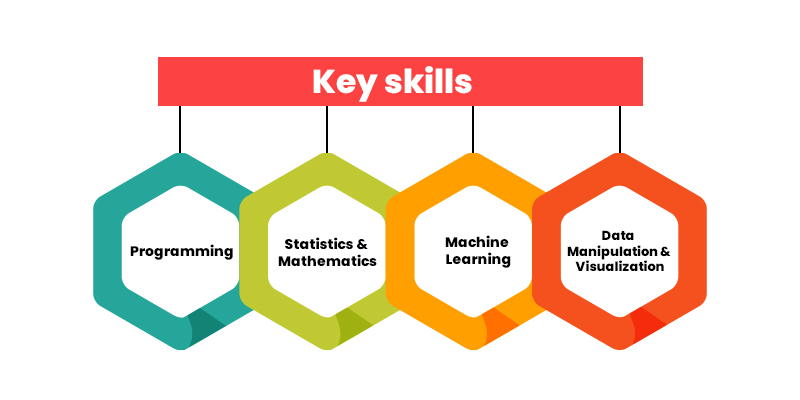In today’s business world, the role of a data scientist has emerged as one of the most demanded and transformative professions. Organizations are increasingly relying on Data and skilled individuals to unlock valuable insights from this wealth of information. So this blog will equip the candidates with the concepts of what is data scientist, its benefits, and tips for becoming a Data scientist.
Data Science
Data Science is a field that involves the extraction of valuable knowledge from complex and large sets of data. It combines various techniques, algorithms, processes, and systems to analyze structured and unstructured data for making informed decisions, solving problems, and predicting outcomes. Data science finds applications across enormous industries and fields, including finance, healthcare, marketing, social sciences, technology, and much more. It plays a pivotal role in making data-driven decisions, optimizing processes, and discovering hidden insights that can lead to innovation and competitive advantage. Data science is the art and science of turning raw data into valuable insights, predictions, and knowledge, and it relies on a combination of various skills, tools, and techniques from mathematics, statistics, computer science, domain knowledge, and much more. There are numerous freshers jobs in data science where they can apply these skills and start their careers.
Data Scientist
A data scientist utilizes data to understand and explain the phenomenal circumstances around them and help organizations make informed decisions. Working as a data scientist will be challenging in an intellectual way and satisfying in an analytical way. Data scientists are in high demand, as the importance of big data has increased for organizations to make decisions. We will have a closer look at what they are and do and how to become one in the upcoming topics.
What does a Data Scientist do?
A data scientist is a professional who uses diverse techniques, tools, and methodologies to extract meaningful insights, patterns, and knowledge from large and complex datasets. Their role also involves a combination of skills from statistics, mathematics, computer science, domain expertise, and data analysis to problem-solving and making informed decisions. Listed below are the responsibilities of Data Scientists.
- Identifying patterns and trends within datasets to reveal valuable insights.
- Developing algorithms and data models for predicting future results.
- Applying machine learning methods to enhance data quality or refine product offerings.
- Conveying suggestions to cross-functional teams and senior leadership.
- Utilize data tools like Python, R, SAS, or SQL for conducting data analysis.
Difference between Data Analysts and Data Scientists
The work of a Data Analyst and Data Scientist are slightly similar. Both job roles involve the process of identifying new trends and patterns to unlock new ways for the organization to make informed decisions about their operations. However, a Data Scientist has more responsibilities and is typically considered a senior position than a Data Analyst.
Data Analysts can support teams that have set goals in mind in advance, while Data Scientists should often form their own questions. A data scientist might also spend a lot of time developing models, utilizing machine learning, or incorporating advanced programming to identify and analyze data.
BYJU’S offers a wide range of job vacancies for freshers. Interested Candidates can click on Byju’s Jobs For Freshers to apply for various job roles relevant to their skills and abilities.
Data Scientist Salary and Job Growth
The approximate salary of a Data Scientist fresher is 3LPA in India.
There is a high demand for data professionals. As per the US Bureau of Labor Statistics (BLS), Data science occupations are expected to grow much faster than now in the next 10 years. The increased need is associated with the emergence of big data and its growing significance for businesses and various organizations.
Benefits of being a Data Scientist
Listed below are the benefits of being a Data Scientist.
- High Demand and Competitive Salaries: Data scientists are in high demand across various industries due to the increasing reliance on data-driven decision-making. This demand often results in numerous job opportunities and competitive salaries.
- Diverse Career Opportunities: Data science skills are versatile and applicable to a diverse field, from finance and healthcare to marketing and technology. This will provide a data scientist with the flexibility to work in industries that align with their interests.
- Intellectual Challenge: Data scientists regularly tackle complex problems and puzzles using analytical thinking and creativity. The intellectual challenge of finding insights and solutions can be highly rewarding.
- Impactful Work: By extracting insights from data, data scientists contribute to better decision-making, improved processes, and innovative product development. The work they do often has a direct impact on a company’s success and growth.
- Continuous Learning: The field of Data science is rapidly evolving with new techniques, tools, and technologies emerging regularly. Data scientists have the opportunity to engage in lifelong learning, keeping their skills sharp and staying at the forefront of innovation.
- Collaboration: Data scientists often collaborate with experts from various domains, allowing them to learn from different perspectives and contribute to integrative projects.
- Creativity and Innovation: A data scientist requires creativity skills to find innovative ways to interpret data. Data scientists develop new methodologies and approaches to tackle unique challenges.
- Variety of Tasks: The data scientist role involves a mix of tasks, including data cleaning, analysis, modeling, visualization, and communication. This diversity keeps the job interesting and engaging. With a deep understanding of data and its potential, data scientists can identify new business opportunities.
- Remote Work Opportunities: Many data science tasks can be performed remotely, providing flexibility in terms of work location and allowing for a better work-life balance.
- Recognition and Prestige: Successful data scientists often gain recognition for their contributions to their organizations. Their expertise and insights are highly valued, leading to professional prestige.
- Global Relevance: The skills and techniques learned as a data scientist are globally applicable, enabling professionals to work in different countries and industries around the world.
- Job Security: As data continues to play a major role in modern businesses, the high demand for data scientists is expected to remain strong, providing a sense of job security.
- Opportunities: With a deep understanding of data and its potential, data scientists can identify new business opportunities.
If you are in search of job opportunities in Hyderabad, you can look for job openings available in that city. Visit fresher job openings in Hyderabad to find job positions that are relevant to your skills and abilities.
How to Become a Data Scientist?
Becoming a data scientist involves a combination of education, skills development, practical experience, and continuous learning. Data science is an integrated field that requires expertise in programming, statistics, machine learning, and domain knowledge. Here’s a step-by-step guide on how to become a data scientist:
- Educational Qualification: Obtain a bachelor’s degree in a relevant field like Engineering, Computer science, Statistics, or Mathematics. A strong foundation in mathematics and programming is important to build the analytical and technical skills necessary for success in the field of data science. These foundational subjects provide the basis for understanding complex algorithms, statistical models, and data manipulation, which are integral to extracting meaningful insights from data sets.
- Advanced Education (Optional): Consider pursuing a master’s in Data Science, Machine Learning, Artificial Intelligence, or a related field. Advanced degrees can provide a deeper understanding of complex concepts and enhance your career prospects by involving you in specialized coursework and research that delves into advanced algorithms, predictive modeling, and the ethical implications of data-driven decisions. Additionally, these programs often offer valuable networking opportunities and collaborations with industry professionals, further preparing you for leadership roles in the rapidly evolving landscape of data science.
- Hands-On Experience: Work on personal projects or participate in online competitions to apply your skills to real-world datasets and gain practical experience. Collaborate on open-source projects or contribute to GitHub repositories related to data science to showcase your abilities to potential employers and establish a portfolio that demonstrates your problem-solving skills, coding proficiency, and capacity to work within a team on projects of significance in the data science community. These hands-on experiences offer invaluable insights into the challenges of data manipulation, modeling, and interpretation that you’ll encounter throughout your data science career.
- Online Courses and Resources: Enroll in online platforms for structured courses on data science, machine learning, and related topics to gain a comprehensive understanding of the theoretical fundamentals and practical applications of key concepts in data science. A lot of platforms offer a wide range of courses taught by industry experts, enabling you to learn at your own pace and acquire skills in data manipulation, statistical analysis, machine learning algorithms, and data visualization, which are fundamental to excelling in the field of data science.
- Build a Strong Portfolio: Showcase your skills through a portfolio that includes your projects, code samples, and explanations of your approach and results. A strong portfolio demonstrates your expertise to potential employers.
- Networking: Attend data science meetups, conferences, and webinars to connect with professionals in the field and stay updated on the latest trends.
- Soft Skills: Develop strong communication skills to effectively convey your findings and insights to both technical and non-technical audiences.
- Apply for Internships and Entry-Level Positions: Look for internships or junior data scientist positions to gain industry experience and further develop your skills.
- Continuous Learning: The field of Data science is rapidly evolving. Stay updated by reading research papers, blogs, and attending workshops to keep refining your skills.
- Specialization: Consider specializing in a specific area, such as Natural Language Processing, Computer Vision, or even Big Data Analytics, depending on your interests and industry trends.
- Certifications (Optional): Obtain certifications from reputable organizations to validate your skills and knowledge.
Remember, becoming a data scientist is a journey that requires dedication and continuous learning. Your ability to solve complex problems using data-driven insights will be a valuable asset in various industries, from technology to healthcare to finance.
Key skills to become a Data scientist
The following key skills are necessary to become a Data Scientist.
- Programming: Learn languages such as Python or R, which are widely used in data science for data manipulation, analysis, and machine learning. Common programming languages for Data Science include Python programming, R, SQL, and SAS.
- Statistics and Mathematics: Develop a strong understanding of statistical concepts, probability theory, and linear algebra to analyze and interpret data. Proficiency in statistics equips you with the tools to accurately summarize data distributions, infer relationships, and assess the significance of findings, while a solid grasp of probability theory empowers you to quantify uncertainty and make informed predictions.
- Machine Learning: Learn about various machine learning algorithms, techniques for model training and evaluation, and how to apply them to solve real-world problems. Understanding machine learning empowers you to transform data into predictive models, enabling you to make informed decisions and automate processes based on patterns and trends identified in the data.
- Data Manipulation and Visualization: Familiarize yourself with libraries like Pandas and Matplotlib in Python to clean, manipulate, and visualize data effectively. Pandas provide powerful tools for data cleaning, transformation, and exploration, enabling you to preprocess data efficiently and extract meaningful information. Matplotlib, on the other hand, empowers you to create informative visualizations, ranging from basic plots to complex visual representations, helping you communicate complex findings visually to both technical and non-technical audiences.
In conclusion, the journey of becoming a data scientist combines technical expertise, analytical and critical thinking, and a passion for uncovering insights from data. By following the steps mentioned above in this guide, you can create a path that leads to a rewarding career in the field of innovation and problem-solving. So, in this blog, we discuss what is data scientist, its benefits, and tips for how to become a data scientist.







